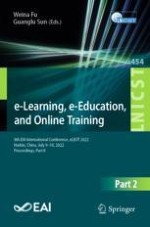The two-volume set, LNICST 453 and 454 constitutes the proceedings of the 8th EAI International Conference on e-Learning, e-Education, and Online Training, eLEOT 2022, held in Harbin, China, in July 2022.
The 111 papers presented in this volume were carefully reviewed and selected from 226 submissions. This conference has brought researchers, developers and practitioners around the world who are leveraging and developing e-educational technologies as well as related learning, training, and practice methods. The theme of eLEOT 2022 was “New Trend of Information Technology and Artificial Intelligence in Education”.
They were organized in topical sections as follows: IT promoted Teaching Platforms and Systems; AI based Educational Modes and Methods; Automatic Educational Resource Processing; Educational Information Evaluation.
